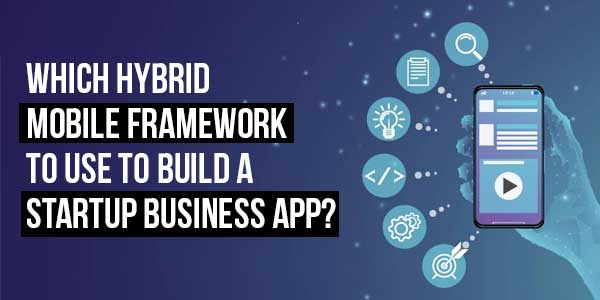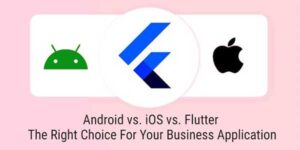
In today’s fast-paced digital landscape, startups need to be agile, cost-effective, and innovative to succeed. One of the key components of a successful startup is a robust mobile application that can reach a wide audience and provide a seamless user experience. However, developing a mobile app can be a daunting task, especially for startups with limited resources. This is where hybrid mobile frameworks come into play. They offer a cost-effective solution by enabling developers to build apps for multiple platforms using a single codebase. In this blog post, we will explore various hybrid mobile frameworks and help you decide which one is best suited for your startup business app.
Table of Contents
Understanding Hybrid Mobile Frameworks:
What Are Hybrid Mobile Frameworks?
Hybrid mobile frameworks allow developers to create applications for multiple platforms, such as iOS and Android, using a single codebase. These frameworks utilize web technologies like HTML, CSS, and JavaScript, wrapped in a native container that enables the app to access device features and deliver a native-like experience.
Benefits of Using Hybrid Frameworks
- Cost-Effectiveness: Building a single app for multiple platforms significantly reduces development costs and time.
- Cross-Platform Compatibility: Reach a broader audience by deploying the app on both iOS and Android.
- Faster Development Cycle: Code reusability speeds up the development process, enabling quicker time-to-market.
- Easier Maintenance: Managing a single codebase simplifies updates and bug fixes.
Popular Hybrid Mobile Frameworks
Flutter:
Overview:
Flutter, developed by Google, is an open-source UI toolkit for building natively compiled applications for mobile, web, and desktop from a single codebase. It uses the Dart programming language and provides a rich set of pre-designed widgets.
Advantages:
- Fast Performance: Flutter’s unique architecture and the use of the Dart language result in fast performance and smooth animations.
- Hot Reload: Allows developers to see changes in real time, speeding up the development process.
- Rich UI Components: A wide range of customizable widgets makes it easy to create beautiful and responsive UIs.
- Strong Community Support: Backed by Google, Flutter has a growing and active community providing extensive resources and plugins.
Considerations:
- Learning Curve: Dart is a less common language, which might require additional learning for developers unfamiliar with it.
- App Size: Flutter apps tend to have larger initial download sizes due to the framework’s built-in components.
React Native:
Overview:
React Native, developed by Facebook, is one of the most popular hybrid frameworks. It enables developers to build mobile applications using JavaScript and React, a popular web development library.
Advantages:
- Familiarity: JavaScript is widely used, making it easy for web developers to transition to mobile app development.
- Large Community: A vast and active community provides numerous libraries, tools, and plugins.
- Native Components: Offers the ability to write platform-specific code, allowing apps to access native features and achieve high performance.
- Code Reusability: A significant portion of code can be shared across platforms, reducing development time and effort.
Considerations:
- Performance: Although React Native apps perform well, they may not match the performance of fully native apps, especially for complex graphics and animations.
- Dependency on Third-Party Libraries: Many features rely on third-party libraries, which may vary in quality and maintenance.
Ionic:
Overview:
Ionic is a popular open-source framework for building hybrid mobile applications using web technologies such as HTML, CSS, and JavaScript. It provides a library of pre-designed UI components and tools for building cross-platform apps.
Advantages:
- Web Technology Familiarity: Developers experienced in web development can easily adapt to Ionic.
- Pre-Built UI Components: A rich set of UI components accelerates development and ensures a consistent look and feel.
- Integration with Angular: Ionic can be used with Angular, a powerful framework for building dynamic web applications.
- Strong Community and Resources: A large community and extensive documentation provide valuable support and resources.
Considerations:
- Performance Limitations: Ionic apps may face performance challenges, particularly with complex animations and graphics.
- Dependence on WebView: Apps run within a WebView, which may affect performance compared to native apps.
Xamarin:
Overview:
Xamarin, owned by Microsoft, is a cross-platform framework that allows developers to build native apps using C#. It provides access to native APIs and tools, enabling the creation of high-performance applications.
Advantages:
- Native Performance: Xamarin apps have access to native APIs, resulting in high performance and native-like experiences.
- Single Language: Developers can use C# for both front-end and back-end development, streamlining the development process.
- Integration with Microsoft Ecosystem: Xamarin integrates seamlessly with Microsoft tools and services, such as Azure and Visual Studio.
- Code Sharing: A significant portion of code can be shared across platforms, reducing development time and effort.
Considerations
- App Size: Xamarin apps tend to have larger file sizes due to the inclusion of the .NET runtime.
- Limited Third-Party Libraries: Compared to other frameworks, Xamarin has a smaller selection of third-party libraries.

Choosing the Right Framework for Your Startup:
Assess Your Requirements:
Before choosing a hybrid mobile framework, it’s essential to assess your startup’s specific requirements and goals. Consider the following factors:
- Target Platforms: Determine which platforms you want to support, such as iOS, Android, or both.
- Budget and Timeline: Consider your budget and timeline for development, as some frameworks may require more resources and time than others.
- Team Expertise: Evaluate your team’s expertise and familiarity with different programming languages and frameworks.
- App Complexity: Assess the complexity of your app, including features, graphics, and animations.
Evaluate Framework Features:
Consider the features and capabilities of each framework to determine which one aligns best with your requirements:
- Performance: Choose a framework that offers the performance necessary for your app’s functionality.
- UI/UX Components: Look for frameworks with rich UI components and design flexibility to create an engaging user experience.
- Community Support: Consider the size and activity of the framework’s community, as this can impact the availability of resources and support.
- Integration with Existing Tools: Evaluate how well the framework integrates with your existing tools and services, such as back-end systems and development environments.
Consider Future Scalability:
When selecting a framework, consider the future scalability of your app. Choose a framework that can accommodate future growth and expansion, such as adding new features or supporting additional platforms.
Best Practices for Hybrid Mobile App Development:
Focus on User Experience:
- Responsive Design: Ensure your app is responsive and adapts to different screen sizes and orientations.
- Intuitive Navigation: Design clear and intuitive navigation to help users easily find what they need.
- Consistent UI: Maintain a consistent look and feel across platforms to provide a seamless user experience.
Optimize Performance:
- Efficient Code: Write efficient and optimized code to ensure fast performance and smooth interactions.
- Lazy Loading: Implement lazy loading for images and content to improve load times and reduce resource usage.
- Minimal Animations: Use animations sparingly and ensure they do not affect performance or accessibility.
Test Thoroughly:
- Cross-Platform Testing: Test your app on multiple devices and platforms to identify and resolve compatibility issues.
- User Testing: Conduct user testing to gather feedback and identify areas for improvement.
- Performance Testing: Perform performance testing to ensure your app runs smoothly and efficiently.
Conclusion:
Choosing the right hybrid mobile framework is a critical decision for startups looking to build a successful business app. By evaluating your requirements, assessing framework features, and considering future scalability, you can select the best framework to meet your needs. Whether you choose Flutter, React Native, Ionic, or Xamarin, focusing on user experience, optimizing performance, and thorough testing will ensure your app’s success.
“The best way to predict the future is to create it.” – Peter Drucker
By selecting the right hybrid mobile framework and following best practices, you can create a powerful and scalable app that meets the needs of your users and drives your startup’s success.

















“Insightful post! 📱🌐 Choosing the right hybrid mobile framework is crucial for building a successful startup business app. Your comparison of the different options provides valuable guidance for making an informed decision. Thanks for sharing your expertise on this topic!”
Welcome here and thanks for reading our article and sharing your view. This will be very helpful to us to let us motivate to provide you with more awesome and valuable content from a different mind. Thanks again.